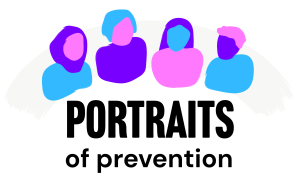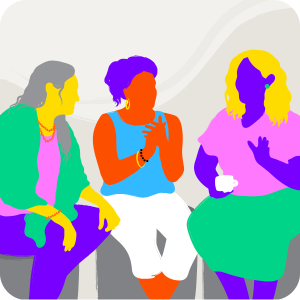
Starlady
LGBTIQ+ primary prevention – Zoe Belle Gender Collective
Zoe Belle Gender Collective is a small trans and gender diverse-led advocacy organisation that was previously funded as a pilot project under Rainbow Health Australia’s primary prevention project.
Their current focus is on distributing their existing resources and campaigns, providing high level practice and policy advice to government and building the capacity of primary prevention organisations to prevent gender-based violence against trans and gender diverse people, their families and friends. One of their key focus areas is to prevent men’s intimate partner violence against trans women and trans feminine people. This work is supported by key partnerships with Rainbow Health Australia, Safe and Equal and Women’s Health in the North.
Their work does not currently have ongoing funding and is mostly self-funded through fee for service training. While ad hoc project grants are sometimes received, there is currently no funding directed to trans and gender diverse-led organisations to deliver prevention programs or to support sector development.
There are a number of programs that contribute to primary prevention by working against the drivers in specific settings but are unlikely to consider their work as primary prevention – e.g. the Healthy Equal Youth program. They instead understand their work as part of broader LGBTIQ+ advocacy and programs for health and wellbeing. The broader work of LGBTIQ+ inclusion in organisations and services (through inclusion training and Rainbow Tick accreditation) also contributes to primary prevention in a similar way.
ZBGC’s flagship project is Transfemme, which aims to promote healthier dating and relationships between trans women and cis men. Transfemme was created by the Zoe Belle Gender Collective in collaboration with a collective of Australian-based trans women and transfeminine people and cis men who have experience in dating or are in relationships with trans women or trans feminine people. It includes resources designed for trans women and trans feminine people, cis men, family and friends and family violence practitioners supporting these communities.
The content is based on their lived experience as well as sector and community consultation and is aligned with the approach outlined in Pride in Prevention. ZBGC have also translated some of this work from Transfemme to create resources aimed at preventing sexual violence against trans and gender diverse people more broadly.
ZBGC advocate for the prevention system to consider addressing family of origin violence against LGBTIQ+ young people. They also deliver training to the family violence primary prevention, early intervention and response workforces on a fee for service basis. This training provides an overview of drivers, prevalence and tips for practice.
Starlady’s work in primary prevention is informed by her work advocating for trans and gender-diverse communities. There is a significant overlap between the public health, health promotion and community development work of LGBTIQ+ community-controlled organisations and the primary prevention of gender-based violence. Both have a similar focus on addressing the social determinants of health, including harmful social attitudes, systems and norms.
Starlady’s broader work has largely focused on educating health and human service providers in LGBTIQ+ affirmative practice, addressing barriers to access (including victims of violence) and reducing both direct and systemic discrimination. This is achieved through workforce training, community workshops, policy advocacy, written resources and sector partnerships. This work focuses on addressing the drivers of violence against LGBTIQ+ communities: cisnormativity, heteronormativity, transphobia and homophobia.
Starlady’s practice includes a focus on transmisogyny – the intersection of sexism and transphobia in the lives that drives discrimination and violence against trans women and trans feminine people. She argues that understanding transmisogyny is essential for preventing violence against trans women, which is often overlooked or dismissed as general transphobia.
Starlady also draws on her previous experience working in remote Aboriginal communities, where she provided hairdressing and fashion workshops informed by principles of community development, primary prevention and health promotion. During this time, she often had to navigate responding to disclosures of violence from individuals and communities and support safety.
This background in cross-cultural engagement and community development supports her to work sensitively and respectfully within cultural frameworks other than her own.
Over time, Starlady expanded her expertise to include primary prevention frameworks such as Pride in Prevention and Change the story. Through her direct practice Starlady has learned that men’s violence against women is influenced by broader social attitudes, especially from family and friends. While the focus is often on men’s behaviour, she believes the social systems surrounding men – including the roles played by cis women – are essential to examine. These systems perpetuate harmful behaviours, and everyone involved in these dynamics has a role to play in dismantling them.
Starlady’s practice has focused on designing campaigns and resources for trans women and trans feminine people and the cis men who date them. It has been significantly more difficult to engage mainstream audiences – such as family, friends and community –s in campaigns on this topic. To achieve this, she believes that messaging must be integrated into mainstream prevention efforts that have broader reach.
Starlady is one of only a very small handful of primary prevention practitioners with expertise preventing violence against trans and gender diverse communities, and the only one she knows of currently focussing on preventing the high rates of violence against trans women and trans feminine people. She believes that systemic transmisogyny across the family violence sector has prevented recruitment and retention of trans women and trans feminine people. This is further compounded by the safety risks and resource strains small organisations face when training new staff from the ground up.
There are currently almost no avenues for acquiring skills specific to trans-inclusive primary prevention. Most learning occurs on the job, with practitioners like herself relying on resources like Change the story, the National Plan, and Pride in Prevention to inform their practice. Starlady is currently advocating for system-wide capacity building to address these issues. She highlights the need for LGBTIQA+ primary prevention training, emphasising that dedicated resources and capacity buildings led by trans communities in partnership are essential for this.
Starlady strongly believes that engaging men requires being able to design accessible, plain language resources on key issues like consent, sex and sexuality and healthy relationship practices. These need to be designed with diverse audiences in mind, as different language is required for different contexts. This engaging approach should strike a balance between meeting men where they are at and avoiding colluding with harmful ideas and norms.
Starlady believes that there needs to be a greater emphasis on preventing sexual violence. To promote consent and prevent sexual violence you need to have a deep understanding of men’s sexuality. Program staff must also recognize the significant role shame and secrecy play in sexual violence and violence against trans women. Men are often placed in rigid, role-model positions, which can make openness about their sexuality challenging. There is a widespread societal discomfort with diverse sexualities, contributing to a culture of fear and secrecy. This is mirrored by a reluctance in the primary prevention workforce to talk about sexuality and the shame and secrecy associated with non-normative sexualities.
Starlady’s work frequently addresses the overlapping issues of racism, sexual objectification and fetishisation and transphobia, particularly as they impact trans women of colour. She believes that meaningful partnerships between organisations and communities require cultural awareness, trust and genuine connections that go beyond conventional professional boundaries, encouraging mutual respect and a greater sense of shared humanity. She stresses that it is important to not assume that multicultural and multifaith organisations are transphobic or homophobic, while also acknowledging that there are cultural complexities that need to be understood.
Read more portraits of prevention
Jessica
Sport setting
Jessica is a manager in a specialist gendered violence prevention team that is funded to build the capacity of community sport and recreation to address and prevent gender-based violence.
Samantha
Specialist primary prevention
Samantha is a senior practice leader working in one of the small number of specialist organisations that are solely focused on primary prevention.
Djirra
Aboriginal-led prevention
Djirra is dedicated to early intervention and the prevention of family violence. Djirra brings a holistic approach to prevention, grounded in culture, community and connection.



